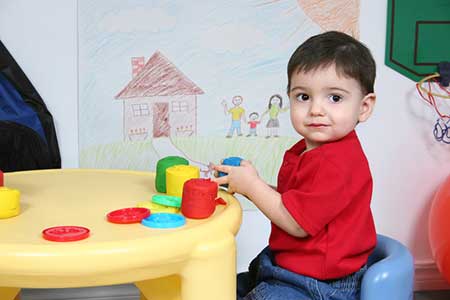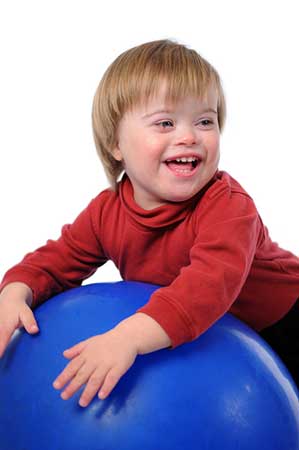 In a pediatric setting, Occupational Therapists treat children with a variety of diagnoses and address a variety of skill areas by working with families, as well as during therapy sessions. Some of these include:
In a pediatric setting, Occupational Therapists treat children with a variety of diagnoses and address a variety of skill areas by working with families, as well as during therapy sessions. Some of these include:
- Fine motor skills – using the hands, eyes, lips and tongue
- Gross motor skills – movement using the large muscles, (i.e., running, jumping, etc.)
- Visual motor skills – using the hands and eyes together to accomplish a task
- Visual Perceptual skills– understanding depth perception, the visual qualities of objects such as size, shape and color, seeing objects in a complex background such as finding a small item in a drawer full of things, following lines on a page
- Self-help skills – the ability to feed, dress, and groom oneself, etc.
- Sensory skills – Using all of the senses to learn. Regulating the senses to sleep well, concentrate on a task, eat a wide variety of foods, tolerate noisy, active environments, and much more.
These are some of the skills you may observe your child doing:
Normal Sensory Integration Development Sequences
When to Consider Referring a Child to Occupational Therapy
Birth to 2 Months:
- doesn’t blink
- does not grasp objects placed near palm
3 Months
- does not follow an object with her eyes
- hands remain closed almost all of the time
- frequently resists being held
- becomes upset when moved, as when being picked up, laid down, or handed from one familiar person to another
4 Months
- does not swipe at or reach for objects
- does not bring hands or objects to his mouth
- frequently irritable for no apparent reason
- does not place both hands on her bottle while fed
5 Months
- does not hold his own bottle
- doesn’t smile at his image in a mirror
6 Months
- involuntarily drops objects after only a few moments
- does not actively grasp large finger foods such as teething cookies when they are
- placed on the highchair tray
- is excessively and consistently upset by leaving the home
7 Months
- does not transfer an object from one hand to the other
 10 Months
10 Months
- not beginning to pick up small objects
- does not poke with index finger
- is not accepting a variety of food textures
- is excessively upset by being dressed, diapered, bathed, or having hair groomed
12 Months
- isn’t able to pick up a cheerio or other small object with tip of the thumb and the tip of the index finger
- is not sleeping through the night most of the time
- is not interested in exploring toys made for one year-olds
- is excessively upset by sound of siren, barking dog, vacuum cleaner, or other familiar loud noise
15 Months
- cannot put a one-inch object into a container with a slightly bigger opening
- cannot stack two cubes
- cannot put a round form into a round shape on a puzzle
18 Months
- cannot point to a few of the following body parts: eyes, nose, mouth, hair, tummy, legs, feet, and hands
- cannot turn pages of a cardboard book, or regular small book two or three pages at a time.
- cannot stack four blocks
24 Months
- play with toys only by tapping, shaking, or throwing
- cannot unscrew top of a one-inch or two-inch bottle
- cannot remove socks, untied shoes, or pull-on pants without help
30 Months
- cannot imitate drawing a vertical line or a circular scribble on paper immediately after seeing an adult draw these lines
- cannot stack eight to ten cubes
- cannot imitate drawing a horizontal line immediately after seeing an adult draw a horizontal line
36 Months
- cannot remove all pull-on clothing after fasteners have been undone
- does not imitate the actions of adults in the home
- does not pretend during play
HCEI dba Karen A. Fay Occupational Therapy Services
We provide occupational therapy services to individuals from infant to adult. If you think you know of an individual may qualify for our services, or if you’re just not sure, see How to Obtain Services. Alternatively, you may visit our Occupational Therapy Services page for more information.
Do you have more questions?
Call 928-776-9285, or email us using the form below.
